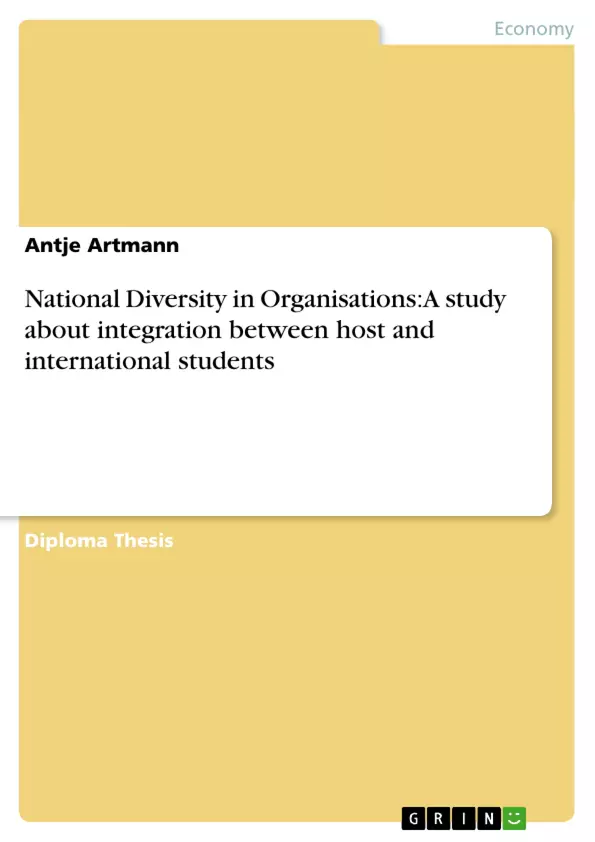This thesis focused on international students (Germany, Belgium, Cuba, USA, Ecuador
and the Bermudas) residing in the Netherlands for the period of their studies and Dutch
host students studying at the faculty of Economics and Business Administration University
Maastricht, the Netherlands. The aim of this study was to examine whether the relationship
between international students (n=10) and host students (n=5) is concordant (consensual)
or discordant (conflictual or problematic). The acculturation orientations of both groups
have been assessed using Berry’s (1992, 1997) four acculturation strategies as there are:
integration, assimilation, separation and marginalisation. Bourhis´ et al. (1997) Interactive
Acculturation Model has been applied to explore the relational outcomes between the
groups.
In this study it was shown that integration is the strategy most preferred by host students.
However, international students reflect separation (n=5), integration (n=3) and a mixture
of integration and assimilation features (n=2). Accordingly, the acculturation profiles of
host and nationally diverse students are concordant (consensual) between host- (n=5) and
international students (n=5) and discordant (conflictual or problematic) between host-
(n=5) and international students (n=5).
The findings suggest that Dutch language skills, a Dutch partner, multinational living
arrangements and interest in- and openness towards the Dutch society enhance integration
and assimilation orientations. On the contrary, the geographical closeness to the home
country, a close relationship to family and friends from the home city, the multilingual skills
of the Dutch society, a high percentage of friends with the same nationality and linguistic
background support separation orientations among international students. In addition, the
large (numerical) size and homogeneity (in terms of nationality and language) of the group
of German students represented at the faculty influence the acculturation orientations of
international students and enhance separation orientations.
Inhaltsverzeichnis (Table of Contents)
- 1 Introduction
- 1.1 Short overview of diversity research
- 1.2 Aim and Contribution of the final thesis
- 1.3 Structure
- 2 Intergroup behaviour
- 2.1 Social identity
- 2.2 Social categorisation
- 2.2.1 The concept of familiarity and social discrimination
- 2.3 Social comparison
- 2.3.1 In-group favouritism
- 2.3.2 In-group bias
- 2.4 Conclusion
- 3 The Acculturation
- 3.1 Multicultural ideology
- 3.2 Acculturation attitudes
- 3.3 The uni- and bidimensional model
- 3.4 Acculturation strategies
- 3.5 The Interactive Acculturation Model (IAM)
- 3.5.1 Host community acculturation orientations
- 3.5.2 Relational outcomes of host and foreign acculturation orientations
- 3.6 Conclusion
- 4 Research on immigrant- and international student populations
- 4.1 Overview of empirical studies
- 4.2 Applied social psychology theories
- 4.2.1 Social categorisation: minority group formation
- 4.2.2 Social identity: minority group identification
- 4.2.3 Social comparison: from national to international
- 4.3 Conclusion
- 5 Research design
- 5.1 Introduction
- 5.2 Aim of the research
- 5.2.1 Short outline of the Interactive Acculturation Model and its application
- 5.3 Participants and procedure
- 5.3.1 The interviews
- 5.3.2 The questionnaires
- 6 Findings
- 6.1 The group of German students
- 6.1.1 Applied acculturation strategies
- 6.2 The group of foreign students
- 6.2.1 Applied acculturation strategies
- 6.3 The group of Dutch students
- 6.3.1 Expected acculturation strategies
- 6.4 Relational outcomes
- 6.4.1 University life
- 6.4.2 Social life
- 6.1 The group of German students
- 7 Conclusion
- 7.1 Summary of results
- 7.2 Discussion
- 7.3 Limitations
- 7.4 Future research
- 7.5 Practical implications
- 7.6 Concluding remarks
Zielsetzung und Themenschwerpunkte (Objectives and Key Themes)
This thesis examines the relationship between international and Dutch host students at Maastricht University's Faculty of Economics and Business Administration, focusing on the degree of concordance or discordance in their acculturation orientations. The research seeks to understand how these orientations are influenced by factors such as language skills, social networks, and cultural background.
- Intergroup behaviour and social identity
- Acculturation strategies and the Interactive Acculturation Model
- The experiences of international and Dutch students
- Factors influencing acculturation orientations
- Relational outcomes of host and foreign acculturation orientations
Zusammenfassung der Kapitel (Chapter Summaries)
The thesis begins by providing an overview of diversity research and outlining the aim and structure of the study. Chapter 2 explores key concepts from social psychology, including social identity, categorisation, and comparison, laying the groundwork for understanding intergroup behaviour.
Chapter 3 delves into the concept of acculturation, outlining different models and strategies. The chapter focuses on Berry's four acculturation strategies and Bourhis' Interactive Acculturation Model, which are central to the research methodology.
Chapter 4 examines research on immigrant and international student populations, highlighting relevant social psychology theories and providing a context for the study's findings. Chapter 5 details the research design, outlining the methods used to collect data, including interviews and questionnaires.
Chapter 6 presents the findings of the study, focusing on the acculturation strategies employed by German, foreign, and Dutch students, as well as the relational outcomes observed between these groups.
Schlüsselwörter (Keywords)
The thesis explores key concepts such as diversity, integration, acculturation, social identity, intergroup behaviour, social categorisation, social comparison, international students, host students, and the Interactive Acculturation Model. It also investigates the impact of factors such as language skills, social networks, and cultural background on acculturation orientations.
- Arbeit zitieren
- Antje Artmann (Autor:in), 2003, National Diversity in Organisations: A study about integration between host and international students, München, GRIN Verlag, https://www.grin.com/document/16806



